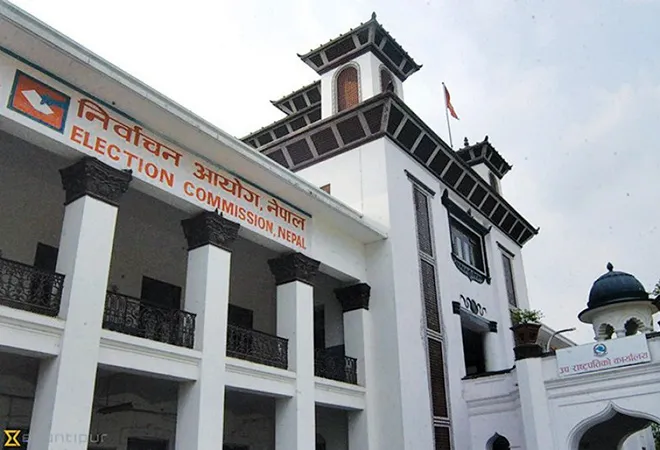-
CENTRES
Progammes & Centres
Location
The arrival of the new party RSP represents a distinct shift in the Nepali polity, one that is ringing the death knell of traditional parties

By-elections in Nepal are usually a subdued affair. Not this time though. With three heavyweight candidates, the April by-elections in constituencies of Chitwan, Tanahun, and Bara districts saw their fair share of verbal spats and physical fights. Economist Dr Swarnim Wagle, long feted by the Nepali media as a potential finance minister and a rising star within the party, broke away from the Nepali Congress (NC) because of ‘continuous insults and humiliations from the Deuba-Arzu gang’—alluding to NC chair Sher Bahadur Deuba, his wife Arzu Rana Deuba, and leaders close to them. Wagle had been denied a ticket in the earlier election too, despite helping draft the manifesto and being one of the most prominent younger faces of the old party.
Wagle’s departure from the NC was another shot in the arm for the rising Rastriya Swatantra Party (RSP), which promptly inducted him and made him a candidate from Tanahun 1— one of two parliamentary constituencies of Tanahun district. The RSP has seen a meteoric rise in Nepal’s contemporary politics, emerging as the fourth-largest party in its very first election outing in November 2022. But its chair, Rabi Lamichhane, a former TV anchor known for his anti-establishment nationalistic politics, was disqualified as an MP after it emerged he hadn’t applied for Nepali citizenship after giving up his American nationality. Lamichhane, who had been deputy prime minister and home minister before the disqualification, had vowed to come back stronger, which he did, garnering more than 54,000 votes in the by-election in Chitwan 2. Subsequent to the victories, the RSP has pulled out from the ruling coalition. Lamichhane has now said that the party will now play the role of a ‘strong Opposition’.
The RSP has seen a meteoric rise in Nepal’s contemporary politics, emerging as the fourth-largest party in its very first election outing in November 2022.
In the third constituency, Bara 2, noted Madhes leader and Janata Samajwadi Party (JSP) Chair, Upendra Yadav, sought to save face after losing in the Saptari 2 constituency in November’s election. But he came up against another rising force in Nepali politics—the Janamat Party, led by once-secessionist Madhes leader C.K. Raut. Although Yadav won, political equations in the Madhes have recalibrated since the days Yadav led the Madhes movements in 2008, and for a while during the counting, Yadav surely would have been nervous. Yadav eventually won by a margin of 5,081 votes against Shiva Chandra Kushwaha of Janamat Party, who received more than 23,000 votes.
What the RSP represents is a distinct shift in the Nepali polity, one that is ringing the death knell of traditional parties. While anti-incumbency is a common thread in electoral democracies, parties such as the NC, the Communist Party of Nepal (Unified Marxist–Leninist), and Maoists now face an existential threat in Nepal. The threat is born out of widespread discontent against what the population has perceived as poor governance and service delivery as well as pervasive corruption practised by leaders of the three parties – best seen in the ongoing Bhutanese refugee scam. Up until now, the old party could take comfort in the fact that Nepali politics had no alternative, but that is no longer true.
The new alternative
Over the years, several new parties in Nepal have been established with the key agenda of presenting an alternative to existing political forces. But all of them were mostly splinter groups, such as former Maoist leader Dr Baburam Bhattarai’s Naya Shakti, or former UML leader Madhav Kumar Nepal’s UML-Socialist. After the second Constituent Assembly election in 2013, the Bibeksheel Nepali party was founded on the plank of good governance and anti-corruption, but the party’s merger with the Sajha Party—whose leader would declare himself a monarchist soon—would prove to be a setback. However, latent discontent and frustration against traditional parties, especially among the urban youth, continued to simmer, until the RSP provided an outlet.
The RSP has successfully created a new template for alternative politics in Nepal because of a few reasons. Although Nepal’s population is ageing, 70 percent of the population is under the age of 40. The generation gap was best seen in the general elections in November 2022, when half of the voters were under the age of 40, but two-thirds of all candidates were above 40.
Latent discontent and frustration against traditional parties, especially among the urban youth, continued to simmer, until the RSP provided an outlet.
Nepal has also urbanised rapidly in the 21st century, leading to increased information flows and political awakenings not beholden to ideologies of the past. While traditionally, political parties in Nepal relied on a steady source of cadres through the higher education system—hence the extreme politicisation of universities in Nepal—more and more Nepalis are now either enrolled in private institutions or have left the country to either study or work abroad. Old-school cadre-based politics may continue to fuel traditional parties, but younger Nepalis, for whom social media has become the primary source of information, can no longer connect with the older parties. Although non-resident Nepalis are not allowed to vote remotely, the support of Nepalis living abroad has been crucial for the RSP, with on-ground reports suggesting that migrants convinced family and relatives in Nepal to vote for Lamichhane’s party.
The geriatric leaders of the older parties appear hopelessly out of touch with these new realities, and coupled with increasing corruption, inefficient government service delivery, and lack of economic opportunities inside the country, the old parties are no longer seen as leaders for a new generation of Nepalis. Such discontent found flavour even in the local government elections in May 2022, when independent candidates such as Balen Shah and Harka Sampang Rai became mayors of Kathmandu and Dharan respectively.
It is this feeling that the RSP—and the Janamat Party in the Madhes to a certain degree—has capitalised upon. The RSP’s success is based on excellent social media presence, with their ideology based on a simple anti-corruption and better governance agenda, and mobilising public sentiment against traditional parties. Their MPs, particularly Sumana Shrestha, have succeeded in creating a new template for representation and transparency, wherein the population is regularly consulted and updated on policy issues—perhaps a first for Nepal’s parliamentary democracy.
The geriatric leaders of the older parties appear hopelessly out of touch with these new realities, and coupled with increasing corruption, inefficient government service delivery, and lack of economic opportunities inside the country, the old parties are no longer seen as leaders for a new generation of Nepalis.
One may argue that a single election may not be sufficient to declare a larger political shift. While the argument holds true, a dysfunctional government will create adequate political space for parties like the RSP, which see more potential in future elections than ones in the present. To that end, unless the older parties shift trajectories, they will certainly cede more ground to RSP. Such a dramatic shift, however, looks unlikely for the older parties, not least because the three big parties are limited by their internally autocratic and undemocratic setups, where younger leaders are not given the space to grow—hence the resignation of members such as Dr Wagle.
What next?
RSP’s anti-corruption platform has proven to be a success because of the endemic graft inside Nepal’s governing bodies. At this moment, the Nepal police has unearthed a massive scam where Nepali politicians, civil servants, and local henchmen have been swindling Nepalis for years by promising to send them to the US as Bhutanese refugees. While human trafficking cases have been reported every now and then, the current scam has resulted in the arrest of a former NC home minister and his personal secretary, a former home secretary, and a former security advisor to the ministry. A top UML leader and former deputy prime minister was finally arrested after absconding for 10 days, with his son too arrested in the scam. Several other names came up during the course of the investigation, including that of Arzu Rana-Deuba. The anti-corruption sentiment is at an all-time high, and as more skeletons tumble out of the parties’ closets, the pressure is now on their leaders to punish the guilty.
Corruption cases aren’t new to Nepal. But a culture of impunity has seen implicated politicians returning to the centre stage without consequences, often because criminal investigations were impeded by political interference to save the guilty. The ruling coalition is now under severe pressure to not follow the same template, perhaps more so than at any other time in Nepal’s democratic political history, because alternatives such as the RSP are watching the case intently.
While human trafficking cases have been reported every now and then, the current scam has resulted in the arrest of a former NC home minister and his personal secretary, a former home secretary, and a former security advisor to the ministry.
So far, the RSP has been successful in overturning traditional political dynamics within urban areas. This trend will continue. The RSP’s future success will depend on how far its organisational set-up can expand into the hinterlands and less-urban areas of Nepal. Its leaders have suggested the party will now emphasise on organisation-building. It has also found it difficult to find a footing in the Madhes so far, where the rise of C.K. Raut’s Janamat Party now threatens traditional Madhes parties such as the JSP and the Loktantrik Samajwadi Party (LSP). Further west, the Nagarik Unmukti Party has laid a claim to Tharu votes, thus, putting in motion a political trend that emphasises regionalism and local factors beyond traditional political ideologies.
The current five-year term may be the last chance for old parties to redeem themselves. As the quality of governance is abysmal and corruption is all-pervasive, even marginal improvements will favour them. On the other hand, any hints of political interference in the current refugee scam will be widely opposed both inside and outside Parliament, and seen as another instance of the older parties favouring impunity and corruption.
The RSP tsunami may well displace the older parties if it finds the right mix of candidates and issues. Nepal’s economy is currently struggling, with little hope of recovery unless structural reforms are implemented. If the state of Nepal continues as is—with low economic growth, few opportunities, continued out-migration of its younger citizens, and poor governance—all bets will be on parties that don’t represent conventional strands of Nepali politics, such as the RSP, to succeed in the next elections.
Amish Raj Mulmi is the author of All Roads Lead North: Nepal’s Turn to China. He has written extensively on Nepal for various publications.
The views expressed above belong to the author(s). ORF research and analyses now available on Telegram! Click here to access our curated content — blogs, longforms and interviews.

Amish Raj Mulmi is the author of All Roads Lead North: Nepal's Turn to China (Context/Hurst/Oxford University Press). He has written for Carnegie Endowment for ...
Read More +